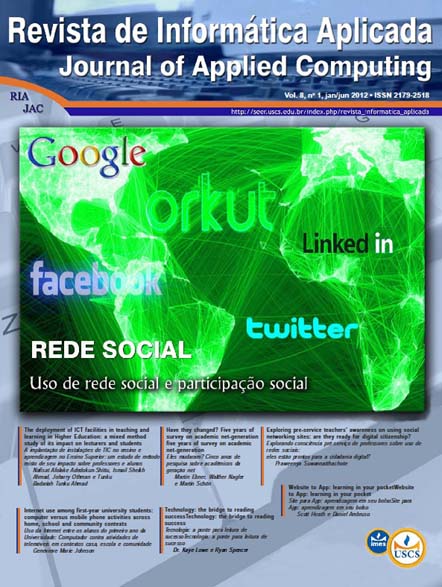Explorando Consciência Pré-serviço de Professores Sobre Uso de Redes Sociais: Eles Estão Prontos para a Cidadania Digital?
DOI:
https://doi.org/10.13037/ria.vol8n1.1906Abstract
Undergraduate students have been widely-adopted Social Networking Sites (SNSs) such asFacebook. Some issues were discussed among users concerning the users' netiquette. For users likepre-service teachers who may or may not use SNSs for their communication tools in near future, however,there is a need for teacher education institutes to prepare their digital citizenship. This study examinedthree hundred and seventy seven pre-service teachers of the awareness of SNSs communication behaviors.Quantitative data indicated that the number of network friends was the most significant factors effects toSNSs communication behaviors and awareness. Qualitative data from the open-ended question revealedthe need to revise the ED-TECH course for pre-service teachers to have more deep understanding ondigital citizenship.Downloads
References
BOYD, D. M., & ELLISON, N. B. (2008). Social network sites: Definition, history, and scholarship. Journal of Computer-Mediated Communication, 13, 210-230.
DAVIES, J. (2012). Facework on Facebook as a new literacy. Computers & Education. 59, 19-29.
LUKE, C. (2003) 'Pedagogy, connectivity, multimodality, and interdisciplinarity'. Reading Research Quarterly. 38(3), 397 - 403.
MAZER , J. P., MURPHY, R. E. & SIMONDS, C. J. (2007). I'll See You On ''Facebook'': The Effects of Computer-Mediated Teacher Self-Disclosure on Student Motivation, Affective Learning, and Classroom Climate. Communication Education. 56 (1), p. 1-17.
PRENSKY, M. (2001). Digital natives, digital immigrantss. On the Horizon, 9(5), 1-6.
LIVINGSTONE, S. (2008) Taking risky opportunities in youthful content creation: teenagers' use of social networking sites for intimacy, privacy and selfexpression. New Media Society 10 (3):393-41.
RIBBLE, M. S., BAILEY, G. D., & ROSS, T. W. (2004). Digital Citizenship: Addressing appropriate technology behavior http://www.digital citizenship.net/uploads/1stLL.pdf
RICHARDSON, W. (2006). Blogs, wikis, podcasts, and other powerful Webtools for classrooms. Thousand Oaks, CA: Corwin Press.
Downloads
Published
Issue
Section
License
Copyright (c) 2012 Praweenya Suwannatthachote

This work is licensed under a Creative Commons Attribution-NonCommercial-ShareAlike 4.0 International License.
Os autores que publicam trabalhos na RIA estão de acordo com os seguintes termos:
- Autores mantêm seus direitos autorais e concedem à RIA o direito à primeira publicação. Admite-se o compartilhamento do referido trabalho, desde que seja reconhecida sua autoria e publicação inicial nesta revista.
- Autores podem fechar contratos adicionais separadamente, para distribuição não exclusiva da versão do trabalho publicado na RIA, com reconhecimento de sua autoria e publicação inicial nesta revista.
- Autores podem publicar e distribuir seu trabalho online, antes ou durante o processo editorial.


